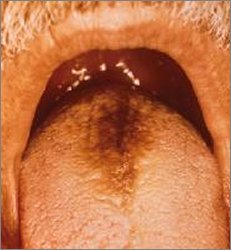|
|

|

What Your Tongue Says about Your Health:
Nine "Tongue Signs" to Watch Out For
by www.SixWise.com The tongue is an incredibly important muscle that helps you
to chew and swallow food, taste (the average tongue has about
9,000 taste buds) and speak. When it's healthy, your tongue
should be slightly pink in color, moist, and fairly smooth.
However, if your tongue is dry, coated, discolored or painful,
it could indicate a problem.
|

A healthy tongue should be pink, moist and fairly smooth.
|
Tongue Problems to Watch Out For
A change in the appearance or feeling of your tongue could
be related to the tongue itself or another problem within
your body. Meanwhile, some tongue changes are harmless while
others may indicate health issues are present. Here are some
common tongue scenarios, along with what they may be telling
you.
-
Hairy Tongue: If the papillae (small bumps) that
cover the surface of your tongue become enlarged and profuse,
it can make the tongue appear hairy or furry. This is
harmless (but if the appearance is bothersome antibiotics
are sometimes given).
-
Geographic Tongue: This condition is characterized
by smooth, bright red patches on the top of the tongue.
The patches can change size and location from day to day
(and have a map-like, or geographic, appearance). There
may also be some soreness or burning. This condition is
also harmless and usually resolves on its own in a few
months (it's sometimes triggered by stress, hormonal changes
or allergies).
-
Fissured Tongue: This is another harmless condition
in which deep grooves form on the tongue's surface. In
fact, fissured tongue is an inherited trait that normally
occurs in 10 percent of population.
-
Black Tongue: A black, coated tongue can result
from an overgrowth of bacteria and yeast in the mouth,
which then accumulate on the papillae and cause discoloration.
This is a harmless condition that can usually be resolved
by brushing your tongue with a toothbrush twice a day.
Rinsing your mouth with diluted hydrogen peroxide can
also help remove the discoloration.
-
Smooth, Pale Tongue: A smooth tongue can be a
sign of nutritional deficiencies, particularly vitamin
B-12 deficiency. It can also be an indicator of anemia.
|

A black, hairy tongue is a harmless condition caused
by enlarged papillae and an overgrowth of bacteria in
the mouth.
|
-
Canker Sores on the Tongue: A viral ulcer or "canker
sore" may appear on the tongue. These can be painful
but will go away on their own. Canker sores can appear
for apparently no reason, though some doctors believe
they are triggered by stress and fatigue.
-
Enlarged/Swollen Tongue: A swollen tongue can
be caused by a number of disorders, including strep infection,
Down's syndrome, leukemia, cancer, and hypothyroidism.
It can also be a minor side effect due to a hangover or
an allergic reaction to food or medication.
-
Red Tongue: If your tongue is red (from dark pink
to magenta) it could be a sign of nutritional deficiencies,
particularly that you may not be getting enough folic
acid, vitamin B-12 or vitamin B3.
-
White Tongue: A white coating on your tongue could
mean that you are dehydrated. It can also be caused by
smoking or drinking alcohol. A white coating can also
be a sign of thrush, which is an infection of the mouth
with the yeast Candida albicans.
How to Keep Your Tongue Healthy
To keep your tongue clean and healthy, along with brushing
your teeth regularly experts recommend using a tongue
scraper twice a day. Tongue scrapers are inexpensive,
and it takes only about 10 or 15 seconds to do: just slide
the scraper gently over your tongue (you don't need to press
hard!), repeat three or four times to reach the entire surface,
and you're done.
Recommended Reading
What
to Do if Your Teeth Get Knocked Out (and 9 MORE Important
Injury Tips)
The
11 Signals Your Nails are Giving You About Your Health
Sources
Medline
Plus Medical Encyclopedia
MayoClinic.com
To get more information about this and other highly important topics, sign up for your free subscription to our weekly SixWise.com "Be Safe, Live Long & Prosper" e-newsletter.
With every issue of the free SixWise.com newsletter, you’ll get access to the insights, products, services, and more that can truly improve your well-being, peace of mind, and therefore your life!
|
|
|
|